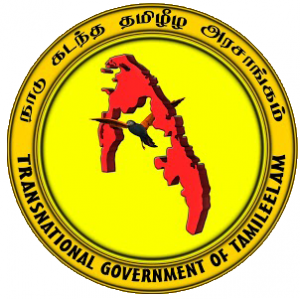TGTE Applauds Northern Provincial Council’s Resolution on Sri Lanka Referral to the ICC and a Referendum
Transnational Government of Tamil Eelam (TGTE)
“Tamils faced atrocities simply because they were born as Tamils”
COLOMBO, SRI LANKA, September 12, 2018 /EINPresswire.com/ —
Transnational Government of Tamil Eelam (TGTE) applauds Sri Lanka’s Northern Provincial Council for passing a unanimous Resolution to Refer Sri Lanka to the International Criminal Court (ICC) and to hold a UN sponsored Referendum to find a permanent political solution for the Tamil conflict in Sri Lanka.
“We salute you, the Northern Provincial Council, for this Resolution to get justice for the tens of thousands of Tamils who were killed and hundreds of Tamil women who were raped by the Sri Lankan security forces. These Tamils faced atrocities simply because they were born as Tamils,” said Prime Minister of TGTE Mr. Visuvanathan Rudrakumaran.
“Despite, the Sri Lankan Government’s attempt to mislead the international community and despite the very large number of Sri Lankan security forces present in Tamil areas, you passed this Resolution expressing the wishes of the Tamil nation. This resolution demonstrates that the political aspirations of the Tamils inside the island of Sri Lanka and the outside are the same. Unified, we are a force to be reckoned with. Yes to referendum.” added Rudrakumaran.
“While every Member of the Council should be thanked for this achievement, we especially wish to thank Mr. M.K. Shivajilingam for sponsoring this Resolution. It is noteworthy that the Leader of the Opposition, Mr S. Thavarajah and Council Member Mr. Ayoop Asmin seconded the motion” he concluded.
Contact: pmo@tgte.org
September 11, 2018
RESOLUTION OF THE NORTHERN PROVINCIAL COUNCIL
Calling upon the UNHRC to Refer Sri Lanka to the ICC, and Calling for UN Monitored Referendum for the Political Preference of the Tamil Speaking People
Recalling that the March 2011 Report of the UN Secretary General’s Panel of Experts on Accountability in Sri Lanka stated that there were credible allegations that war crimes and crimes against humanity were committed during the final stages of the armed conflict between the Government of Sri Lanka and the Liberation Tigers of Tamil Eelam, and there could have been as many as 40,000 Tamil civilian deaths;
Emphasizing that according to the November 2012 Report of the UN Secretary-General’s Internal Review Panel on UN Action in Sri Lanka, over 70,000 people were unaccounted for during the final phase of the war in 2009;
Recalling that the Government of Sri Lanka was a cosponsor and signatory to the Resolution 30/1 titled “Promoting reconciliation, accountability and Human rights in Sri Lanka” at the UNHRC session in Geneva in September 2015, inter-alia proposing the establishment of a judicial mechanism with a special counsel to investigate allegations of violations and abuses of human rights and violations of international humanitarian law, as applicable; and affirmed that a credible justice process to include independent judicial and prosecutorial institutions led by individuals known for their integrity and impartiality; and also affirmed in this regard the importance of participation in a Sri Lankan judicial mechanism, including the special counsel’s office, of Commonwealth and other foreign judges, defense lawyers, and authorized prosecutors and investigators;
Noting that as of March 2017, Sri Lanka had failed to take any significant measures to implement its commitments to Resolution 30/1, and at Sri Lanka’s request at the UNHRC Session in March 2017, the Resolution 34/1 which was co-sponsored by Sri Lanka and adopted unanimously, giving 2-year extension until March 2019 for Sri Lanka to implement the Resolution 30/1;
Emphasizing that the Government of Sri Lanka has not only failed to take any meaningful steps towards implementing the Resolutions 30/1 and 34/1, but also the President, the Prime Minister, and the senior members of the government are on record to have stated that they will not fully implement the Resolutions;
Recalling that the political conflict between the Sinhalese and the Tamil speaking peoples in Sri Lanka has been escalating since the independence of the Island from the Great Britain in 1948, and the root cause of the war was the political conflict which has so far not been addressed properly despite numerous attempts;
WHEREFORE THE NORTHERN PROVINCIAL COUNCIL RESOLVES THAT:
1. Since Sri Lanka is still unwilling to fully implement the UNHRC Resolutions 30/1 and 34/1, and if Sri Lanka fails to fully implement the said Resolutions before March 2019, this Council calls upon the Member Countries of the UNHRC to refer Sri Lanka to the UN General Assembly and to the UN Security Council to be referred to the International Criminal Court or to a specially created international criminal tribunal set up by the UN;
2. This Council calls upon the UNHRC to appoint a UN Special Rapporteur for Sri Lanka, to monitor the plight of the war affected Tamil speaking people, disappeared persons, political prisoners, continued arbitrary detention under the Prevention of Terrorism Act, presence of large un-proportionate number of Sri Lankan security forces in Tamil areas, and the occupation of private lands by the Sri Lankan security forces in the North-East region of the Island;
3. This Councils calls upon the UNHRC to urge UN to impose military sanctions on Sri Lanka, until substantial progress is made in this regard;
4. This Council calls upon all member countries of the UN to deny entry visa to Sri Lankan military personnel implicated in the war crime, and explore other avenues, including the application of universal jurisdiction as proposed by UN High-Commissioner for Human Rights in his Annual Report dated 26 February – 23 March 2018;
5. Since Sri Lanka has failed, and is unwilling to offer an equitable political solution to the Tamil speaking people, and failed to take adequate measures to prevent the recurrence of the past violence, this Council calls upon the member countries of the UN to help conduct a UN monitored referendum in the North-East region of the Island to determine the political preference of the Tamil speaking people towards finding a permanent political solution.

